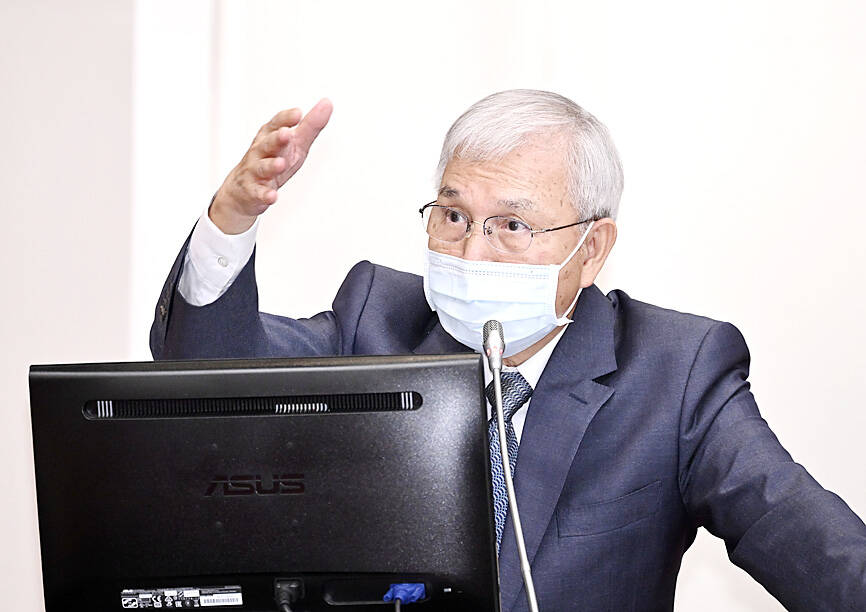Taiwan’s tight monetary cycle is not yet over and consumer price movements would dominate the central bank’s policy decisions, central bank Governor Yang Chin-long (楊金龍) said yesterday.
Yang made the remarks while taking questions from lawmakers at a meeting of the legislature’s Finance Committee, which is reviewing the central bank’s proposed budget for next year.
“The central bank did not rule out the possibility of raising interest rates in the future after leaving interest rates unchanged for the second time in September,” Yang said.

Photo: Peter Lo, Taipei Times
The flexibility in policy stance is appropriate, as inflationary pressures linger and consumer prices have not yet returned to the 2 percent target, he said.
The consumer price index (CPI) last month accelerated above the 3 percent mark as successive typhoons disrupted fruit and vegetable supply and drove up their prices, the Directorate-General of Budget, Accounting and Statistics reported on Tuesday, calling the uptick seasonal and transient.
Yang refused to define his stance as either “dovish” or “hawkish.” Rather, the governor said he is approaching the matter in a “data-dependent” fashion like the US Federal Reserve.
The Fed on Wednesday last week decided to hold its benchmark lending rate at its current 22-year high for the second consecutive policymaking meeting.
Taiwan’s central bank detailed its reasoning and considerations in the minutes of the September board meeting, Yang said.
In the document released last week, all board directors supported a policy pause to avoid straining the economy, but some raised the need to revive rate hikes if rents, housing prices and public expectations warrant tightening.
Taiwan’s export-reliant economy would come out of the woods and resume steady growth from this quarter, giving the central bank room to focus on its mandate to stabilize consumer prices, several directors said.
The US, the EU and the UK all share the need to turn the CPI back to the 2 percent target so that inflation would not wipe out the benefits of economic growth for average people, Yang said.
The policy goal might not be achievable until 2025, as major central banks seek to dodge a hard landing and services inflation tends to be sticky, the governor said.
Taiwan’s inflation is relatively moderate at an estimated below 2.5 percent this year and would lose further steam next year, Yang said.
The central bank is looking to generate NT$200 billion (US$6.2 billion) to the state coffers next year, in line with cautious management of the nation’s foreign exchange reserves, the governor said.
The approach enabled the monetary policymaker to stay profitable last year, despite a bearish market worldwide, he said.

GROWING OWINGS: While Luxembourg and China swapped the top three spots, the US continued to be the largest exposure for Taiwan for the 41st consecutive quarter The US remained the largest debtor nation to Taiwan’s banking sector for the 41st consecutive quarter at the end of September, after local banks’ exposure to the US market rose more than 2 percent from three months earlier, the central bank said. Exposure to the US increased to US$198.896 billion, up US$4.026 billion, or 2.07 percent, from US$194.87 billion in the previous quarter, data released by the central bank showed on Friday. Of the increase, about US$1.4 billion came from banks’ investments in securitized products and interbank loans in the US, while another US$2.6 billion stemmed from trust assets, including mutual funds,

Micron Memory Taiwan Co (台灣美光), a subsidiary of US memorychip maker Micron Technology Inc, has been granted a NT$4.7 billion (US$149.5 million) subsidy under the Ministry of Economic Affairs A+ Corporate Innovation and R&D Enhancement program, the ministry said yesterday. The US memorychip maker’s program aims to back the development of high-performance and high-bandwidth memory chips with a total budget of NT$11.75 billion, the ministry said. Aside from the government funding, Micron is to inject the remaining investment of NT$7.06 billion as the company applied to participate the government’s Global Innovation Partnership Program to deepen technology cooperation, a ministry official told the

AI TALENT: No financial details were released about the deal, in which top Groq executives, including its CEO, would join Nvidia to help advance the technology Nvidia Corp has agreed to a licensing deal with artificial intelligence (AI) start-up Groq, furthering its investments in companies connected to the AI boom and gaining the right to add a new type of technology to its products. The world’s largest publicly traded company has paid for the right to use Groq’s technology and is to integrate its chip design into future products. Some of the start-up’s executives are leaving to join Nvidia to help with that effort, the companies said. Groq would continue as an independent company with a new chief executive, it said on Wednesday in a post on its Web

Taiwan Semiconductor Manufacturing Co (TSMC, 台積電), the world’s leading advanced chipmaker, officially began volume production of its 2-nanometer chips in the fourth quarter of this year, according to a recent update on the company’s Web site. The low-key announcement confirms that TSMC, the go-to chipmaker for artificial intelligence (AI) hardware providers Nvidia Corp and iPhone maker Apple Inc, met its original roadmap for the next-generation technology. Production is currently centered at Fab 22 in Kaohsiung, utilizing the company’s first-generation nanosheet transistor technology. The new architecture achieves “full-node strides in performance and power consumption,” TSMC said. The company described the 2nm process as